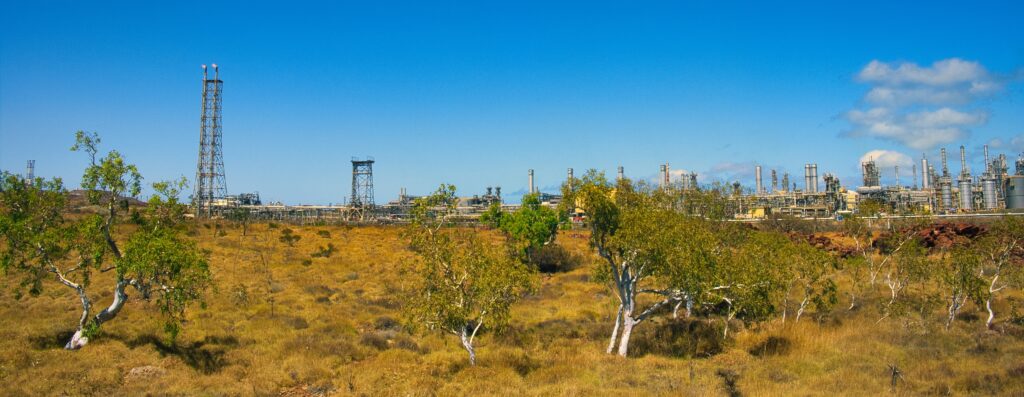In light of the National Climate Risk Assessment, surely our governments have a responsibility to address Australia’s contribution to climate change, writes Professor Nicholas J. Talley AC.
The recently released National Climate Risk Assessment highlights the high risks of climate change across health, the natural environment, economy, trade and finance, and national security. The findings are credible, sobering and conservative. 63 nationally significant risks have been identified. The nation will face increased deaths from heat related illness, coastal inundation, loss of infrastructure, supply chain issues, spread of infectious diseases, loss of insurance coverage and inability to adequately respond to concurrent and cascading disasters.
Despite being aware of the pending report, on the 12th of September the Federal government ticked off the final approval for the North West Shelf Extension, enabling Australia’s largest fossil fuel company, Woodside, to process offshore gas there until 2070. We don’t even gain much economically. The petroleum resource rent tax is inadequate, and overall Australians are losing out on both tax revenue and health; a national disgrace.
As a signatory country to the Paris Agreement, a legally binding international treaty on climate change, Australia is required to submit a Nationally Determined Contribution (NDC), including a new emissions reduction target, every five years. The Anthony Albanese government released Australia’s most recent NDC on the 18th of September. Australia’s 2035 emission target of 62–70% on 2005 levels fails to meet the scale of the problem we face under dangerous climate change, as outlined by the world’s leading scientists, including the authoritative IPCC.

Current Australian government actions are not congruent. On the one hand, we have a government clearly delineating the risks to Australians of climate change, and on the other approving projects that will without doubt make the problem worse. Australia’s domestic emissions are substantial but more importantly we are responsible for 4.5% of global fossil fuel carbon dioxide emissions (80% from fossil fuel exports — coal, oil and gas). As a doctor this seems antithetical, and would be akin to me treating a patient’s COPD with puffers and oxygen, whilst still strongly encouraging them to smoke tobacco. Such behaviour would be contrary to the principles of proper patient care and is unethical.
In 2024 Doctors for the Environment Australia released in Parliament House Canberra an evidence-based report summarizing why fossil fuels are a severe yet largely silent health threat (just like smoking is a serious health hazard). The continued dependency on coal, oil and gas is causing immense direct and indirect health harms from air pollution and plastic pollution as well as driving climate change health risks and biodiversity loss. In my view as doctors, we have a moral responsibility to speak out on this issue, just as we have done with great effect on other serious public health risks from asbestos, stone bench tops and vaping to tobacco.
Recently, DEA went to the federal court, asking for a judicial review of the government regulator NOPSEMAs approval of the environmental plan for Woodsides Scarborough gas project. The Scarborough project is set to add another 878 million tonnes of CO2 eq to the atmosphere, increasing the climate risks for all our communities, so we felt we had a responsibility to ensure that the approval process for the project was robust and evidence-based.
Our assertion was that the regulator should never have approved the environmental plan because it did not do what it is meant to do, which is to reduce environmental impacts to an acceptable level and as low as reasonably practicable.
As our barrister put it in court, we contended that Woodside’s Environmental Plan for Scarborough was “meaningless corporate puffery”.
Unfortunately for DEA, the court found in NOPSEMA’s favour and upheld the plans’ approval, meaning Woodside can now start extracting gas there for processing at the Burrup Hub.
It’s important to point out that this decision was not because the court did not accept the threat of climate change, as evidenced by this quote from the presiding judge, Justice McElwaine:
“It is not for this Court to adjudicate on the existential threat posed by climate change caused by anthropogenic CO2 emissions to the atmosphere.”
He ruled it was not the court’s role to scrutinise the merit of NOPSEMA’s decision.
Which begs the question, whose responsibility is it? Certainly, the 2025 United Nations International Court of Justice ruling after reviewing mountains of evidence and submissions is clear cut: All states are obligated to take action to protect people and limit global warming to the level set by the Paris agreement.
Doctors for the Environment Australia has stated that while addressing climate change is the most important health intervention our government can take, the federal government did not deliver on that responsibility. “This target of 62-70% by 2035 is not enough to protect the health of Australians nor that of the environment upon which we all depend.”
Our governments and regulations are failing us. In light of the National Climate Risk Assessment, surely our governments have a responsibility to address Australia’s contribution to climate change by regulating against coal and gas expansion and setting robust emissions reductions targets? Australia is the world’s third largest exporter of fossil fuels, with Newcastle where I live having the world’s largest coal port, so there is certainly room for improvement.
This means that we too have a responsibility to play our part as health professionals, to use the opportunity afforded us as trusted members of our community to stand up to our government and to the fossil fuel industry for what is right; to use our voice to call out the harmful effects of these actions on human health and the health of our environment, to be on the right side of history.
Our children and theirs will face many risks we have not had to endure, and these are rated high to severe risks according to the National Climate Risk Assessment report. Given the seriousness of this problem based on rock solid science, we cannot ethically sit by and watch as this existential threat unfolds. The hypocrisy of reporting on climate risk and expanding fossil fuels seems obvious, but unfortunately that is what our Australian government is doing.
Personally, I have accepted that I, like everyone, have a responsibility to act. I will continue to highlight the health hazards of fossil fuels in my academic and professional life. I drive an EV and hope many more will replace their petrol and diesel cars with hybrids or EVs. As chair of DEA, I will continue to advocate to the government for a response to climate change that centres on improving human health. And I am proud that we sought a judicial review of the government regulators actions despite our loss. We are not finished yet.
Fundamentally, the climate crisis is a health crisis. Governments and industry need to put our health first, as the UN International Court of Justice has ruled. As doctors, we led the charge to quit tobacco. Let’s change the world again and lead the charge to transition promptly and quit fossil fuels.
Join Doctors for the Environment: as a charity your support helps us advocate for a healthy planet.
Distinguished Laureate Professor Nicholas J. Talley AC is a gastroenterologist and public health physician, researcher and educator. He is Board Chair of Doctors for the Environment Australia.
The statements or opinions expressed in this article reflect the views of the authors and do not necessarily represent the official policy of the AMA, the MJA or InSight+ unless so stated.
Subscribe to the free InSight+ weekly newsletter here. It is available to all readers, not just registered medical practitioners.
If you would like to submit an article for consideration, send a Word version to mjainsight-editor@ampco.com.au.

 more_vert
more_vert
Isn’t it a terrible thing that the fossil fuel industry and our governments know the terrible risks to health from climate change?
I am proud that DEA has stood up in court against the government regulator NOPSEMA and Australia’s largest fossil fuel company Woodside, showing that we doctors accept our duty of care even whilst these big players are doing such monumental harm.
Unfortunately for DEA, the court found in NOPSEMA’s favour and upheld the plans approval, meaning Woodside can now start extracting gas there for processing at the Burrup Hub. It also means that DEA has a rather significant legal bill and would welcome contributions to our Chuffed campaign to pay costs.
https://chuffed.org/project/145557-support-dea-protect-your-health
Every contribution, large or small, will go directly to ensuring DEA can keep standing up to fossil fuel giants like Woodside. Please give today.
Hear, hear! As medical professionals we have an ethical responsibility to act in the interests of the health of our patients and the community. The risks to every aspect of all of our lives – and especially health and wellbeing – of climate change are enormous and have recently been clearly outlined in the National Climate Risk Assessment. We have a responsibility to advocate for our governments to take climate action commensurate with the risk – and that includes moving against the vested interests of the fossil fuel industry.
What matter if Australia reduces CO2 emissions to zero if we export fossil fuels to be burnt overseas.